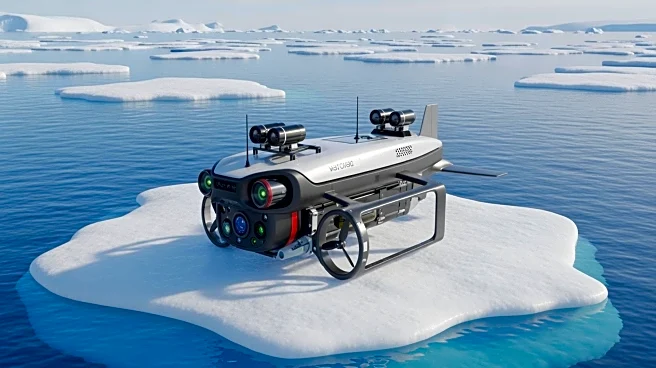What's Happening?
The University of Gothenburg has announced the acquisition of a new HUGIN autonomous underwater vehicle (AUV) to replace its previous vehicle, 'Ran,' which was lost under an Antarctic glacier in 2024.
This purchase is made possible through a significant donation from Voice of the Ocean and insurance funds. The new vehicle, named 'Ran II,' will allow researchers to continue their vital work in Antarctica, particularly in studying the Thwaites grounding-line glacier. The HUGIN AUV is renowned for its high-resolution sensors and ability to collect comprehensive geophysical data from hard-to-reach areas, such as beneath glaciers and deep-sea regions. The new model boasts improved navigation and emergency decision support, enhancing safety and precision in challenging environments.
Why It's Important?
The acquisition of 'Ran II' is crucial for ongoing research into the mechanisms driving ice melt in Antarctica, a key factor in understanding global sea-level rise. The University of Gothenburg's work, led by Professor Anna Wåhlin, has already provided unprecedented insights into the Thwaites glacier, a critical area for climate research. The enhanced capabilities of the new AUV will enable more detailed and accurate data collection, supporting efforts to predict and mitigate the impacts of climate change. This development underscores the importance of technological advancements in environmental research and the role of international collaboration and funding in addressing global challenges.
What's Next?
With the new HUGIN AUV, the University of Gothenburg plans to resume its Antarctic expeditions, focusing on areas previously inaccessible due to the loss of 'Ran.' The improved capabilities of 'Ran II' will likely lead to more comprehensive studies of the Thwaites glacier and other critical regions. The research findings could influence global climate policy and contribute to strategies aimed at mitigating the effects of climate change. Continued support from organizations like Voice of the Ocean will be essential in sustaining these efforts.
Beyond the Headlines
The deployment of advanced AUVs like 'Ran II' highlights the intersection of technology and environmental science, showcasing how innovations can drive progress in understanding complex natural phenomena. This development also raises questions about the ethical implications of technological interventions in fragile ecosystems and the responsibility of researchers to balance exploration with conservation.











